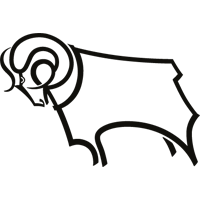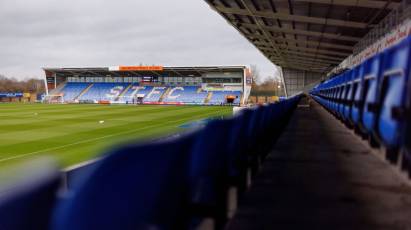Seventy years ago today, the streets of Derby were deserted. Those people who weren’t at Wembley were crouched around their wireless sets. April 27 1946 was The Day That Derby Won the Cup.
After six long, war weary years, the FA Cup was back. And Derby County were on their way to making history in the first post-war Cup Final.
As clubs began to settle down again, the Football League was still a season away. Regional football was still the order of the day, and the Rams played in the League South. So did Charlton Athletic. On a balmy spring day the sides also met at Wembley.
The 1945-46 FA Cup competition is unique: the only one to be played on a home and away basis up to and including the sixth round.
Even then the Rams had to play two semi-final matches. The first one against Birmingham was drawn 1-1 at Hillsborough.
The replay lives on in football history. At Maine Road over 80,000 spectators saw the Rams win 4-0 – still the biggest midweek attendance for a domestic match between two English clubs outside Wembley.
The build-up to the 1946 Cup Final was also fraught with drama. Regular left-back Jack Parr broke an arm in a League South match against Luton Town. His Wembley place was taken by Jack Howe, who was boarding a troopship homeward-bound from India when the Cup run began.
Pre-war England outside-right Sammy Crooks was injured in the sixth-round tie against Aston Villa. Derby-born Reg Harrison took Sammy’s place.
Wing-half Tim Ward also missed out. An army medic – he had been wounded just after D-Day and witnessed the liberation of Belsen concentration camp – Tim arrived home too late to be considered for Wembley.
There was also the business of a Fleet Street reporter taking the Rams skipper, Jack Nicholas, to a gypsy camp to have a curse on the club lifted, and the threat of a players’ strike when the Derby directors gave themselves much better tickets than footballers’ wives. “No better tickets, no game. And we met it,” Jack Stamps recalled years later. The directors relented.
The 1946 FA Cup Final was one of the best of all-time. “One of the most classic displays of football that Wembley has ever staged,” wrote the great Arsenal and Scotland inside-forward, Alex James.
For the first 80 minutes there was no score. “It was just like a normal First Division match,” said Jack Howe.
The Rams enjoyed a slight edge, though, and Raich Carter claims that he was never in any doubt that they would win.
In the 80th minute Derby broke the deadlock, or at least it was broken for them by Charlton half-back Bert Turner.
Carter took up the story: “I took three throw-ins in quick succession, the last of which I threw to Reg Harrison. He turned the ball to Jackie Stamps and he lifted it to Peter Doherty, who flicked it on with his head to where Dally Duncan tried a shot about ten yards out. Bert Turner tried to intercept it but somehow managed to divert it past Sam Bartram and we were in front.”
In the crowd Jack Parr and Sammy Crooks were perched precariously on a plank when the Rams went ahead.
Crooks leapt to his feet and deposited Parr, broken arm and all, on the ground. Derby’s joy was short-lived, however.
Two minutes later Bert Turner took a free-kick and the ball smacked against Doherty’s right shin before flying into the Rams net.
Turner, who 30 years later was scouting for the Rams, is eternally credited with being the first man to score for both sides in an FA Cup Final.
Yet Peter Doherty disagreed: “It was definitely an own-goal. If the ball had not been diverted off me, then Vic Woodley would have saved it easily.”
The 1946 FA Cup Final thus went into extra-time. Yet even in the last five minutes it could have been sewn-up by Derby, had the ball not burst on the way to the Charlton’s net.
Jack Stamps shot never got that far, “The bloody thing just went ‘phut,’” said Jack, and Charlton were saved. Twenty-four hours’ earlier Cumberland referee Mr E.D. Smith, when asked the question on radio, put the chances of that happening as “millions to one”.
It is hard to understand why he would have laid those odds. Footballs were bursting all over the place.
Two of Charlton’s recent League South matches had to be resumed with a new ball. The League game between Charlton and Derby on the Wednesday after the Final would see another burst ball.
And when Charlton returned to Wembley to meet Burnley in the 1947 FA Cup Final, the ball burst yet again.
The Japanese invasion of Malaya in 1941 had meant that rubber was a rare commodity and better spent on things like aircraft production. Good footballs were simply in short supply at the end of the war.
Incidentally, Raich Carter had a low opinion of Mr Smith’s performance in this match: “If anyone was overawed by the occasion, it was the referee.
“He changed his decisions several times. It was understandable, I suppose, because he was so far behind with play.
“If we had had a fast-moving referee, like the one in the semi-final, then we might have scored in the first half.
“Peter Doherty was brought down in their penalty-area, but when we looked around for the ref, he was too far behind play to give a decision.”
With two minutes of extra-time played, the Rams went ahead without any argument.
Stamps worked the ball down the left flank before cracking in a shot-cum-centre which Sam Bartram could only parry.
The ball rolled loose and Doherty literally bowled Dally Duncan out of the way in order to slide the ball into an unguarded net.
Ten minutes later, Doherty returned the compliment and Stamps took his pass and went around Oakes and Phipps before scoring with a brilliant solo effort.
A few seconds after the start of the second period of extra-time, Doherty’s pass was again accepted by Stamps and the burly centre-forward put the issue beyond all doubt.
Alex James summed up: “The 1946 FA Cup Final was a memorable game with a glorious finale. Derby County’s victory was complete and magnificent.” Suddenly, the streets of Derby were alive again.
Supporters wishing to relive Derby County's FA Cup success seventy years ago in full can do so by purchasing Anton Rippon's book The Day That Derby Won The Cup, which is available to purchase from the DCFCMegastore.
Tweets by @ dcfcofficial

 3/1 To Win
3/1 To Win



























